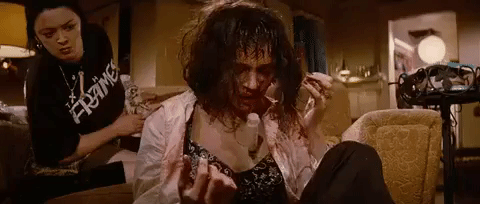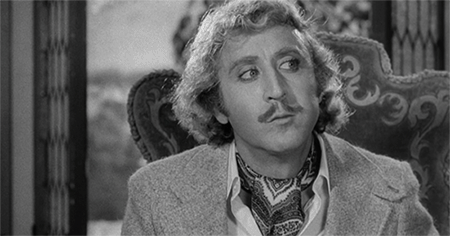
5 reasons why acting in theater makes you better at your job.
7/23/2024 - 7 min read
This ability, however, I have been able to train through many years of performing, and I am improving with each passing year. This allows me to demonstrate resilience to the pressures I may face at work: impending deadlines, mistakes, flash requests, and so on. Keeping my nerves strong in the face of each of these tasks provides considerable peace of mind at work, being aware that I can respond to difficulties without freaking out and, in some cases, galvanizing myself through the very stress itself.
3/4. Commitment and investigation
Two words that definitely need context. I decided to put them together because they're tightly linked to each other, being subsequent in the acting process.
Step 1: Commitment.
In all honesty, having never worked as a professional actor (I've always just been an amateur), I have not had the pleasure of experiencing the work of a professional company. What will follow will, therefore, be merely a representation of my way of understanding and experiencing theater.
We were saying commitment. Thinking back to the first reason I presented, which is that theater is a collective discipline, it comes easy to think why I believe that the actor must exercise the most profound dedication to his work. Extremely long rehearsals, multiple reruns, stressful and tiring performances, and endless hours with people who could easily be incompatible with each other certainly strengthen the actor's temperament. In short, if you want to bring home the result, you have to learn to live with others, sacrifice yourself, and, very often, swallow bitter morsels. These are all basic rules for survival in business and, indeed, in everyday life. In theater, however, these difficulties were exponentially expanded, providing a school of commitment of the highest order.
Playing Prospero in “The Tempest” by W. Shakespeare, directed by L. Gazzola, MaiSentiti Atelier di Teatro (Milan, 2018)


A little stressed Uma Thurman (Pulp Fiction, 1994).
I've heard this sentence many times these days - It's no secret that I spent the last few months focusing on finding a job in the U.S. - and I believe that everyone has at least heard this sentence once in their life.
I came to the US more than one year ago to attend the Johnson Cornell Tech MBA, which has proved to be a real rollercoaster of emotions: from the highest excitement and hopes for a bright future to the most profound stress, regret, and fears. I don't necessarily want to write about the details of this experience (yet). However, when applying for jobs and preparing for interviews, I kept asking myself what out-stands me as a good professional and, generally, a good human being. So, while thinking about what to write in a cover letter to convince a recruiter why I am such a good leader (wink wink), I kept thinking about my personal experience during the MBA and what defines my leadership approach.
Act It Till You Make It
That's when I remembered writing another short essay about theatre and how practicing acting improves everyone's job and social skills. I wrote that article six years ago and still have the same opinion. Still, age and experience should bring savviness, so I hope to serve readers better with this updated version.
A quick premise: I consider myself a relatively introverted individual who deeply enjoys staying home but also spending time with people (even if I might need some convincing first). Knowing everyone's starting point is important, especially when talking about theatre. One might find it confusing: what does theatre acting have to do with professional performance? Are you saying... Fake it till you make it? No! I strongly believe that how you act - not fake - matters in everything. Theater acting provides several learning points. At the end of this article, you might even think you could give it a try.
Before diving into the 5 points, here are some background information that might be helpful:
I started acting when I was 8;
I performed on a stage at least once a year for about 20 years;
I haven't been able to do the same in the last few years - you know... life;
Yet, without my theater experience, I wouldn't be who I am as a professional.
So, finally, here are the 5 reasons why I believe theatre made me a better professional.
1. Theatre is a Collective Discipline.
Best acting team ever (The Office).
This means that everyone must give their personal best and always be prepared to support and deeply trust each other. Without both sides, the target result can never be achieved. During my career, I found this to be incredibly accurate, even in a professional setting. It is always crucial to create united teams that cannot only work together by bringing out the best abilities of each member but also be able to do so while always aiming straight toward a shared goal. I personally believe that being able to work as a team is a sine-qua-non condition for an individual to achieve success, both personally and for their company.
2. StReSS sTrEss S.T.R.E.S.S.


Step 2: Investigation.
The activity that I have always been most passionate about is the one that precedes the rehearsal of the show and continues throughout it, which is the study of the character and the script. Imagining and building a solid and believable background for one's character is one of the most complex activities I can imagine. "Why do I use these words to respond to that provocative line? What is not written in the script that can motivate my actions and behaviors? ". A plethora of questions arise in the performer's mind, pushing them to search for the underlying meaning of behaviors, words, and actions to deeply understand and live their character, ensuring its credibility and robustness.
This necessity develops a capacity for inquiry that not only accustoms the performers to the depth of searching for the reasons behind the problems they face every day but also to never stop at the first and most obvious explanation of the facts, broadening one's views and always pushing beyond the obvious. I wish I could always see this behavior when working with other professionals. From my experience, high performers are always the most curious and dedicated individuals.
5. Public Speaking
Perhaps the most mundane reason, but no less important. Regardless of one's job position, whether it is for a presentation to one's boss or a talk at a major international trade show, during the course of one's work, it often happens that one has to speak in public. I have been fortunate enough to attend numerous presentations at universities, at work, and at events. With extreme peace of mind, I can say that at least 70 percent of people have no idea how to address an audience.


Gene Wilder agrees (Frankenstein Junior, 1974).
Vocal articulation, body language, and explanatory clarity are problems that everyone, sooner or later, has to face head-on. How often have you seen a colleague of yours who, during a presentation to the team, spoke only to the manager (ignoring everyone else) while swaying from one foot to the other, almost as if the floor was burning? Aside from the colleague looking like a penguin, following these presentations is hard. I often find myself thinking back more about how much the "dancing" annoyed me rather than about the topic presented. The best ones, however, are those who turn around, show their beautiful backs, and just look at the projected slides, convinced that you can hear perfectly what they are saying and that the audience will not begin to mind their own business altogether. Well, I'm afraid the opposite happens. Every time.
Unlike the other reasons, however, this need is very much felt at work, so companies send their managers to take exciting public speaking courses, allocating budgets that are not exactly small. These courses will be engaging and super-functional, but I believe that with a few hours of theater a week, you can quietly achieve the same goals with a considerable extra dose of fun.
Ready to Act It?
What I wanted to present are just the first five reasons that came to mind to support my thesis, but I am sure I could stand here for hours writing more. Fighting shyness, increasing one's culture, and making new acquaintances are just a few of the countless additional possibilities that theater gives us.
Speaking often about theater myself, even with friends and colleagues who do not practice it, I have always perceived a particular interest in acting, which, however, rarely materializes then in trying to take a class. This is a real shame: don't let shyness or excuses such as "I don't have time" or "I can't find the perfect school for my needs" stop you. Go for it, it doesn't hurt. Moreover, acting is open to all ages; everyone can find a way to express themselves, unloading everyday frustrations and giving themselves a few hours of fantasy.
I think you could give it a try. What do you think?
Andrea
PS: Tech bros didn't make it here, so I can leave this last message. If I convinced you I'm a good leader and you want to offer me a job, feel free to reach out. I'd be very happy to talk with you.


It happens even to the best of us not to articulate well enough. (Bruce Almighty, 2003).
"Tell me something about yourself"
Theatre. Is. Brutal.
Those who have had the pleasure of attending at least one play in their lives can undoubtedly confirm that the bad actor/actress is remembered most easily. And after leaving the hall, the risk is that they'll just talk about their performance instead of the whole play. One person can ruin an entire company's effort to deliver a great show.
Although those who have acted with me know that I flaunt total calm before every performance, the truth is that underneath, I am tighter than a violin string and feel more adrenaline in my body than Uma Thurman in Pulp Fiction. Tension is a phenomenon that is not only unavoidable but, more importantly, essential, as it allows one to consistently maintain a high level of attention and focus. On stage, this has always allowed me to give my all, channel the excitement, and reap as many of its benefits as possible.

5 reasons why acting in theater makes you better at your job.
Andrea Cappa
7/23/20247 min read
